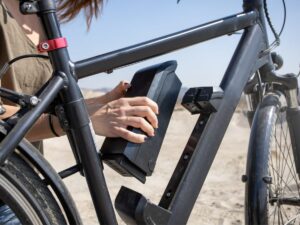
Do You Need A License For A Electric Bike?
- Last updated on

Contents
Electric bikes have become popular in recent years as they are a more affordable and environmentally friendly alternative to other modes of transportation such as cars, buses, or trains. Finding alternative modes of transportation is ideal for city living as it allows more freedom and plenty of exercise!
If you’re looking to get a bike and have come across an electric bike in your search, you might be comparing the two and asking yourself a few questions. These questions may include ‘do you need a license for one of these new electric bikes?’
In this article, we will cover whether or not you need a license to use an electric bike.
What Is An Electric Bike?
The United States federal law defines a low-speed electric bicycle as a ‘two or three-wheeled vehicle that has a maximum motor output of 750 watts and assistance limited to 20mph.’ Essentially, an electric bike is a bike with a motor.
How Does An Electric Bike Work?
Are you wondering how an electric bike compares to a normal bike? Obviously one is eclectic, but some people are unsure of what this actually means. Electric bikes are similar in appearance to a standard push-bike, however, they have a small battery pack and a motor that offers assistance whilst you pedal.
As soon as you start pedaling, the bike motor enables you to do less work rather than just propelling you along. There are different strength settings that allow you to control how much work you want to do. For example, if you’re going uphill you may want to have as much assistance as possible compared to flat ground.
Also Read: How Fast Do Electric Bikes Go?
Rules And Regulations
If an electric bike complies with the regulations set out by federal law as indicated above, they are held to the same standards as a standard push-bike. That being said, different states have different laws on how these bikes are classified and how they may be used.
These differences could include whether or not you need a license, wear a helmet, and need insurance. State laws could also dictate how old you must be to ride an electric bike. As a result, it’s important to check local legislation before riding an electric bike to avoid breaking the law and receiving fines.
Bike Classifications
There are three tiers that categorize electric bikes in the U.S depending on their speed, motor size, and whether it has a throttle.
- Class 1: pedal-assist only, with no throttle, and a maximum assisted speed of 20 mph.
- Class 2: bikes that also have a maximum assisted speed of 20 mph and are throttle-assisted.
- Class 3: pedal-assist only, no throttle, and a maximum assisted speed of 28 mph.
Each state defines an electric bike in its own manner which is why there are different laws in place. Some suggest it is similar to a moped whereas others compare it to a standard push-bike.
Also Read: Best Electric Bikes Under $1000
States You Need A Driver’s License For An Electric Bike
Certain states are stricter than others and require you to have a driver’s license to use an electric bike and carry it with you.
- Alabama
- Alaska
- Louisiana
- Massachusetts
- Missouri
- North Dakota
- Wisconsin
States You Need To Wear A Helmet
Certain states require you to wear a helmet when riding an electric bike, which is advised anyway as riding any bike in public places exposes you to danger from cars and other modes of transport.
- Alabama
- Alaska
- Arkansas – if you’re under 21 and driving a class 3 bike
- California
- Connecticut
- Delaware – under 18’s
- Georgia
- Hawaii – under 16’s
- Indiana
- Louisiana
- Maine – under 16’s
- Massachusetts
- Michigan – under 18’S
- New Hampshire – everyone on a class 3 bike under the age of 18
- New Mexico
- New York – under 18’s and those on bikes that can go more than 20 mph
- Ohio
- Tennessee
- West Virginia
- Wisconsin
Age Limits For Using Electric Bikes
Interestingly, the majority of states have laws regarding the age at which you can use an electric bike. These restrictions usually apply to 14 to 16-year-olds and are mainly due to the lack of regulation that is seen with these types of bikes.
Many states will require those under 18 to wear a helmet, but not those over 18. However, wearing a helmet is still advised no matter your age as it provides vital protection to your head.
Also Read: How Much Do Electric Bikes Weigh?
Where You Can Ride Electric Bikes
There are limits to where you can ride electric bikes, just as there are with normal bikes. Certain states won’t let you ride on the sidewalk, but will let you ride on the bike paths. States that view electric bikes as motor vehicles will allow them to go wherever motor vehicles do.
Rules By State:
- Arizona – sidewalks, bikeways, and roads
- California – legally similar to regular bikes
- Florida, Illinois, Louisiana, Missouri, New Mexico, West Virginia – roads and bike paths
- Georgia – Class 3 bikes can’t ride on multi-use paths and bike paths
- Hawaii, Mississippi, Rhode Island – everywhere
- Indiana – Class 3 can’t drive on trails, bike paths and multi-use paths
- Iowa – Class 2 bikes are the same as regular bikes
- Kansas – those with motors under 1000W have the same rules as regular bikes
- Arkansas, Colorado, Connecticut, Idaho, Kentucky, Maine, Maryland, Michigan, Pennsylvania – same as regular bikes
- Alabama, Alaska, Massachusetts, Minnesota, Nebraska, New York – roads
- New Hampshire – Class 1 and 2 bike paths and multi-use paths, Class 3 on roads
- Delaware, North Carolina, Montana, Virginia – sidewalks, bike paths
- Oklahoma – same as normal bikes, Class 3 forbidden on bike paths
- South Carolina – no road restrictions
- South Dakota – Class 1 and 2 allowed on bike paths and multi-use, Class 3 only on roads
- Tennessee, Washington – Class 1 and 2 bike paths
- Texas – subject to local regulations
- Nevada, New Jersey, North Dakota, Ohio, Oregon, Utah, Vermont, Wyoming – bike paths
- Wisconsin – sidewalks vary from city to city, roads
The Bottom Line
Electric bikes can make getting from A to B a lot easier, especially if you live in an area with lots of hills. Before purchasing an electric bike, make sure you’ve read up on the legislation relating to your state to find out what kind of bike you can use and the rules that apply to it.





